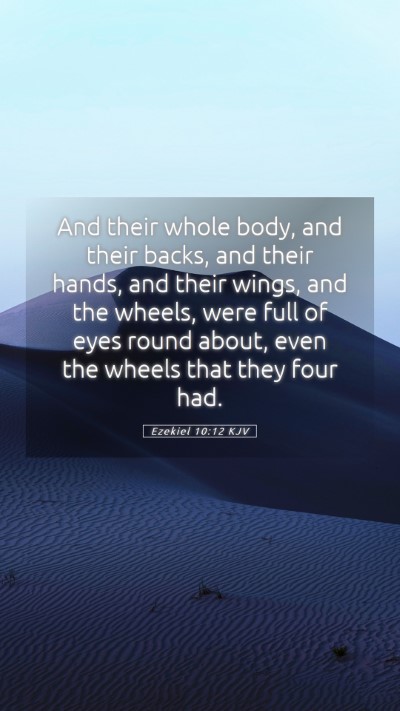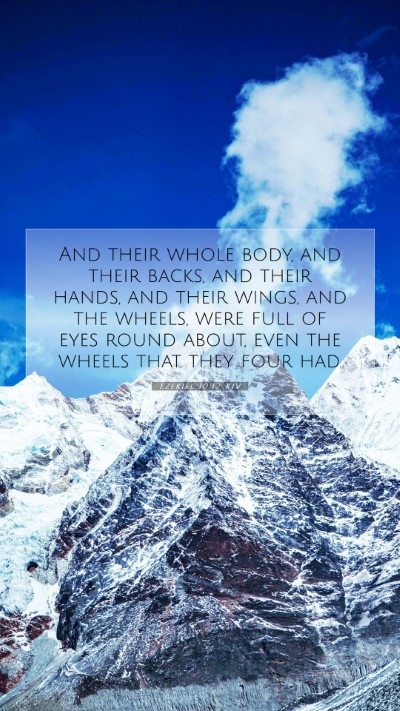Bible Verse Meaning of Ezekiel 10:12
Ezekiel 10:12 states, "And their whole body, and their backs, and their hands, and their wings, were full of eyes round about, even the wheels that they four had; and the wheels had eyes." This verse provides a vivid image of the heavenly beings and their intricate design—an important aspect of Ezekiel's prophetic vision.
The significance of this verse lies in its representation of divine omniscience and glory. As gathered from public domain commentaries like those by Matthew Henry, Albert Barnes, and Adam Clarke, we see that the "eyes" symbolize God's all-seeing nature and His awareness of all things. Each 'eye' indicates vigilance and watchfulness over creation. Let us explore the profound interpretations of this passage.
Insights from Public Domain Commentaries
-
Matthew Henry:
Henry emphasizes that the description of the cherubim with eyes symbolizes the omniscience of God, depicted as overseeing all aspects of the world. He suggests that this imagery serves to remind believers of God's constant presence and attentive care over His creation.
-
Albert Barnes:
Barnes notes that the elaborate structure of these beings illustrates the complexity of God's creation and the order of the celestial host. He points out that the eyes full of knowledge indicate not just watchfulness but also the capability of understanding all matters of humanity and their needs.
-
Adam Clarke:
Clarke discusses the symbolic nature of the "wheels" alongside the cherubim, interpreting them as vehicles of divine purpose. He implores that as God moves throughout the earth, His holy presence is displayed in the meticulous details captured by the numerous eyes, which can be seen as a metaphor for divine wisdom living in every aspect of life.
Understanding the Symbolism
The "eyes" serve as an emblem of divine insight and presence, reminding the faithful that nothing escapes God's scrutiny. Every action, thought, and intention is within His knowledge. This realization may bring comfort to believers, knowing that they are not overlooked, but rather embraced by an insightful Creator.
Thematic Considerations
- Divine Sovereignty: The verse correlates with the overarching theme of God's sovereignty over the universe, establishing His ultimate authority and care.
- Spiritual Perception: The number of 'eyes' can also invite readers to cultivate spiritual awareness in their own lives, promoting a deeper understanding of God's workings in the world.
- Symbol of Omniscience: The fuller understanding of God's character as omniscient impacts the moral and spiritual lives of individuals, inspiring them to lead lives that reflect transparency before God.
Application in Daily Life
This verse can be a source of great encouragement and a call to reflection. Bible study groups can utilize Ezekiel 10:12 for discussions on how to interpret and apply biblical imagery to contemporary life. The profound truth presented prompts believers to ask themselves how they might live in light of God's watchfulness and wisdom. It aids in understanding the responsibility that comes with such knowledge.
Cross References
- Revelation 4:6-8 - The vision of the creatures with multiple eyes, reinforcing the theme of divine observation.
- 2 Chronicles 16:9 - Emphasizing that the Lord's eyes run to and fro throughout the earth.
- Psalms 139:1-4 - Reflecting on God's intimate knowledge of humanity's thoughts and actions.
Conclusion
In conclusion, Ezekiel 10:12 serves not only as a piece of scripture but as a powerful lens through which to view God's relationship with His creation. As believers seek to deepen their Bible verse understanding and Bible verse interpretations, this verse offers a profound insight into the divine nature and encourages an examination of our spiritual life in the light of God's omniscience.


